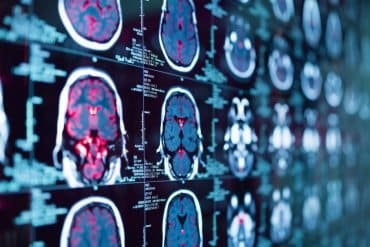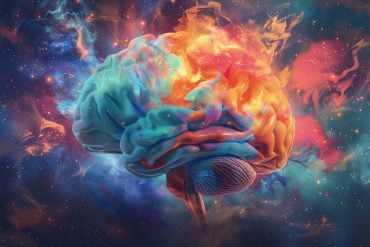Summary: NMNAT2 may protect against the debilitating effects of some neurodegenerative diseases, including Alzheimer’s disease.
Source: Indiana University.
Higher levels of an enzyme in the brain correlate with better cognitive function in older people.
A study led by biomedical researchers at Indiana University has found evidence that an enzyme known as NMNAT2 may help protect against the debilitating effects of certain degenerative brain diseases, including Alzheimer’s.
The research was led by Hui-Chen Lu, the Gill Professor in the Linda and Jack Gill Center for Biomolecular Science and the Department of Psychological and Brain Sciences, a part of the IU Bloomington College of Arts and Sciences. First author Yousuf Ali, an IU research scientist, and three other members of Lu’s lab conducted the work in collaboration with researchers from the Baylor College of Medicine, Massachusetts Institute of Technology, Rush University, University of Texas and Harvard University.
The results appear June 2 in the journal PLOS Biology.
“This study found that NMNAT2, or nicotinamide mononucleotide adenylyl transferase 2, is a key neuronal maintenance factor,” Lu said. “It exerts both an enzyme function to protect neurons from stress caused by over-excitation, and a ‘chaperone’ function, shown for the first time in this study, to combat the misfolded proteins encountered by the brain during aging.”
Many neurodegenerative disorders are caused by accumulation of proteins in the brain. These conditions, called proteinopathies, occur when proteins “misfold,” causing them to grow “sticky” and clump up in the brain in a form often referred to as “plaques,” or “tangles.” As a molecular chaperone, NMNAT2 binds to misfolded proteins to prevent or repair the errors that cause these clumps.
Common proteinopathies are Alzheimer’s, Parkinson’s and Huntington’s diseases, as well as amyotrophic lateral sclerosis, also known as ALS or Lou Gehrig’s Disease. More than 6 million Americans suffer from degenerative brains diseases, with Alzheimer’s disease alone recently estimated to have been a factor in the death of over 500,000 people in the U.S. in 2010.
By examining NMNAT2 levels in brains donated by more than 500 elderly people whose cognitive function was tested annually before death, starting with the year of their enrollment in a clinical study established in 1997. Lu and colleagues found higher levels of NMNAT2 in people who had greater resistance to cognitive decline. People with lower NMNAT2 were more likely to suffer from dementia, suggesting that the protein helps preserve neurons related to learning and memory.
Lu’s team tested this hypothesis in mice whose brains were damaged by high levels of Tau, a toxic protein that correlates with disease progression. They found that increasing the level of NMNAT2 in the hippocampus, a brain region important for learning and memory, significantly lowered levels of Tau.
“Maintaining neuronal health is key to preventing neurodegeneration and dementia,” Lu said.
“This is a fresh look at neurodegenerative disorders,” Ali added.

The power of statistics using large and comprehensive human data sets allowed the team to form a testable hypothesis and then examine it in preclinical animal models to demonstrate causal relationships.
“Such studies are only possible through multidisciplinary team efforts, and we are extremely grateful for our wonderful collaborators and funding support,” said Lu, who credits the contributions of colleagues including Hugo Bellen and Joshua Shulman at Baylor, David Bennett at Rush and Philip L. De Jager at MIT.
“A detailed knowledge of how NMNAT2 maintains neuronal integrity and its role in neuroprotection is critical not only for understanding normal brain function but also for providing necessary insights to assist in the development of new drugs,” Lu said.
This study started in Lu’s lab at Baylor College of Medicine and continued by Ali at IU under Lu’s direction, along with Dena Bakhshizadehmahmoudi and Hunter M. Allen. Additional authors are Bellen, Asante Hatcher, David Li-Kroeger and Shulman at Baylor; Bennett and Lei Yu at Rush University; De Jager, Cristin McCabe and Jishu Xu at MIT; and Nicole Bjorklund and Giulio Taglialatela at University of Texas Medical Branch-Galveston. Jager is also affiliated with Harvard Medical School. Lu joined the Gill Center at IU Bloomington in 2015.
Funding: This research was supported in part by the National Institutes of Health and the Robert A. and Renee E. Belfer Family Foundation.
Source: Kevin D. Fryling – Indiana University
Image Source: This NeuroscienceNews.com image is credited to Indiana University.
Original Research: Full open access research for “NMNAT2:HSP90 Complex Mediates Proteostasis in Proteinopathies” by Yousuf O. Ali, Hunter M. Allen, Lei Yu, David Li-Kroeger, Dena Bakhshizadehmahmoudi, Asante Hatcher, Cristin McCabe, Jishu Xu, Nicole Bjorklund, Giulio Taglialatela, David A. Bennett, Philip L. De Jager, Joshua M. Shulman, Hugo J. Bellen, and Hui-Chen Lu in PLOS Biology. Published online June 2 2026 doi:10.1371/journal.pbio.1002472
[cbtabs][cbtab title=”MLA”]Indiana University. “New Ways to Protect Against Neurodegeneration.” NeuroscienceNews. NeuroscienceNews, 2 June 2026.
<https://neurosciencenews.com/nmnat2-genetics-neurodegeneration-4364/>.[/cbtab][cbtab title=”APA”]Indiana University. (2026, June 2). New Ways to Protect Against Neurodegeneration. NeuroscienceNews. Retrieved June 2, 2026 from https://neurosciencenews.com/nmnat2-genetics-neurodegeneration-4364/[/cbtab][cbtab title=”Chicago”]Indiana University. “New Ways to Protect Against Neurodegeneration.” https://neurosciencenews.com/nmnat2-genetics-neurodegeneration-4364/ (accessed June 2, 2026).[/cbtab][/cbtabs]
Abstract
NMNAT2:HSP90 Complex Mediates Proteostasis in Proteinopathies
Nicotinamide mononucleotide adenylyl transferase 2 (NMNAT2) is neuroprotective in numerous preclinical models of neurodegeneration. Here, we show that brain nmnat2 mRNA levels correlate positively with global cognitive function and negatively with AD pathology. In AD brains, NMNAT2 mRNA and protein levels are reduced. NMNAT2 shifts its solubility and colocalizes with aggregated Tau in AD brains, similar to chaperones, which aid in the clearance or refolding of misfolded proteins. Investigating the mechanism of this observation, we discover a novel chaperone function of NMNAT2, independent from its enzymatic activity. NMNAT2 complexes with heat shock protein 90 (HSP90) to refold aggregated protein substrates. NMNAT2’s refoldase activity requires a unique C-terminal ATP site, activated in the presence of HSP90. Furthermore, deleting NMNAT2 function increases the vulnerability of cortical neurons to proteotoxic stress and excitotoxicity. Interestingly, NMNAT2 acts as a chaperone to reduce proteotoxic stress, while its enzymatic activity protects neurons from excitotoxicity. Taken together, our data indicate that NMNAT2 exerts its chaperone or enzymatic function in a context-dependent manner to maintain neuronal health.
“NMNAT2:HSP90 Complex Mediates Proteostasis in Proteinopathies” by Yousuf O. Ali, Hunter M. Allen, Lei Yu, David Li-Kroeger, Dena Bakhshizadehmahmoudi, Asante Hatcher, Cristin McCabe, Jishu Xu, Nicole Bjorklund, Giulio Taglialatela, David A. Bennett, Philip L. De Jager, Joshua M. Shulman, Hugo J. Bellen, and Hui-Chen Lu in PLOS Biology. Published online June 2 2026 doi:10.1371/journal.pbio.1002472






